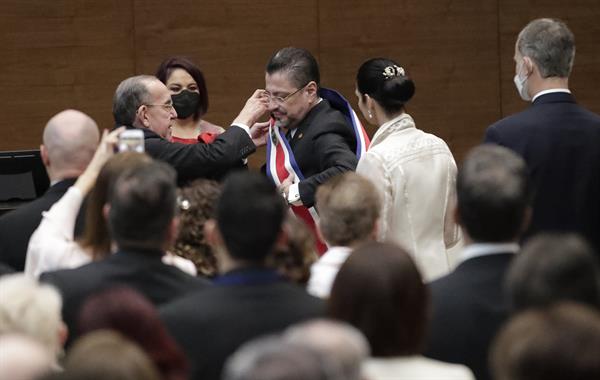11 de mayo 2022

Children of Exile: The Births “Sowing Hope” in the Camp of Nicaraguan Farmers

PUBLICIDAD 1M
PUBLICIDAD 4D
PUBLICIDAD 5D
He was accompanied by the King of Spain, the presidents of Colombia, Panama, and the Dominican Republic, among other guests

Rodrigo Chaves asume la Presidencia de Costa Rica en el Palacio Legislativo. Foto/Efe
On Sunday, May 8, economist Rodrigo Chaves Robles promised to “order and rebuild Costa Rica” as he was sworn in for a period of four years as the 49th president in the history of his country. The ceremony took place at the headquarters of the Legislative Assembly.
Chaves, 60 years old and a member of the recently formed Social Democratic Progress Party, was sworn in by the president of the Legislative Assembly, Rodrigo Arias Sánchez. In his speech Chavez first focused on the challenges of education and poverty.
Next, he expressed his resolve that corruption will not be allowed, nor will he tolerate harassment of women. He affirmed his commitment to work with the private sector and to fight drug trafficking.
The Costa Rican press found the mention of harassment of women as ironic in the comments made minutes after Chaves’ speech concluded, as Chaves was sanctioned at the World Bank in 2019, precisely under such an accusation.
“The idea some want to sell us of a buoyant and tidy house vanishes before the reality of the country (…) We’re not just going to clean the house up, we’re going to rebuild it,” he said. His first decree as president of Costa Rica was to eliminate the mandatory use of masks and vaccinations.
According to the new president, his administration is called to “make a historic change” in their country. First Vice President Stephan Brunner and Second Vice President Mary Munive were also sworn in at the ceremony.
Chaves ratified the pacifist mission of his country, which has no army, and he prayed for Ukraine, invaded by Russia, before the delegations of international guests at the inauguration. Nicaragua was not invited.
Outgoing President Carlos Alvarado handed over the presidential sash to Chaves, officially making him president.
President Chaves arrived in Congress accompanied by his wife, Latvian economist Signe Zeicate, and their two daughters.
Rodrigo Arias, the president of Congress, pointed out in his speech the challenges facing the new president, to reduce inequality and reactivate the economy, as well as to promote “the transformative route of a country that needs to modernize.”
For the first time since 1944, the ceremony was held at the headquarters of the Legislative Assembly for reasons of austerity, since doing so at the National Stadium and other open spaces such as the Plaza de la Democracia are very expensive, according to the incoming government team.
Among the dignitaries who attended the event were the King of Spain Felipe VI; the President of Colombia, Ivan Duque; the president of the Dominican Republic, Luis Abinader; the president of Panama, Laurentino Cortizo: the president of Kosovo, Vjosa Osmani Sadriu; the Prime Minister of Curaçao, Gilmar Pisas; the president of Haiti, Ariel Henry, as well as the president of Morocco, Aziz Akhannouch.
Foreign ministers, vice presidents, ministers, vice ministers and deputies from El Salvador, Guatemala, Cuba, Japan, the United Kingdom, Serbia, Argentina, Mexico, Canada, the United States, Ecuador and Peru were present.
The event was also attended by the first indigenous cacique woman of Costa Rica, Idalia Andrade Degracia, as well as representatives of the Costa Rican indigenous ethnic groups Ngäbes, Cabécares, Bribrís, Chorotegas, Borucas, Malekus and Huetares.
The presidential inauguration was followed by the many thousands of Nicaraguans who have sought refuge in Costa Rica, fleeing poverty or repression ordered by the Ortega regime against its citizens in 2018.
Ortega began his fourth presidential term in January 2022, considered illegitimate by much of the international community. Outgoing Costa Rican president Carlos Alvarado was one of the main advocates for the return of democracy, respect for human rights and the release of political prisoners in Nicaragua.
This article was originally published in Spanish in Confidencial and translated by Havana Times
PUBLICIDAD 3M
Agencia de noticias internacional con sede en Madrid, España. Fundada en Burgos durante la guerra civil española en enero de 1939.
PUBLICIDAD 3D